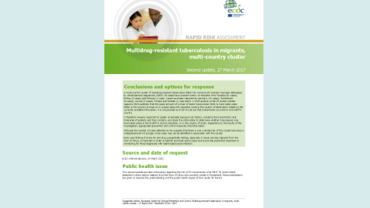Rapid risk assessment: Communicable disease risks associated with the movement of refugees in Europe during the winter season, 16 November 2015
Recent weeks have seen reports of emerging outbreaks of communicable diseases affecting the refugee population and the scale of the current influx of refugees is inevitably putting pressure on public health systems in frontline receiving countries.
This risk assessment focuses on the threat to the refugee population from communicable diseases and assesses the situation in Europe, associated with the current movements of refugees across the region and in the context of their living conditions and the approaching winter, access to shelter, sanitation and health services.
Executive Summary
As winter in Europe approaches, refugees and irregular migrants living in reception centres or in camps may be facing new communicable disease threats to their own health.
A new ECDC rapid risk assessment addresses the key communicable disease health threats currently facing refugee populations, and highlights that while these groups may themselves be more vulnerable to a variety of diseases, they do not represent a threat to established European populations in terms of infectious disease.
Risks posed by diseases whose spread is facilitated by overcrowding, inadequate sanitation and lower temperatures have increased. Cases of louse-borne relapsing fever have already been seen in different locations along the route followed by refugees arriving in Italy. Unless appropriate hygiene measures are implemented in the near future, more cases may be seen among refugees who have recently arrived in the EU.
Refugees arriving in the EU may not be fully vaccinated against a range of vaccine-preventable diseases. They may therefore be more susceptible to outbreaks of diseases such as measles. Offering vaccination to new arrivals in the EU is therefore one of a number of options available to Member States working to limit potential health problems in these vulnerable populations.







